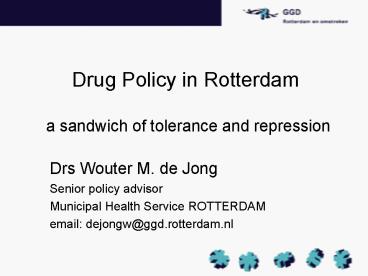Drug Policy in Rotterdam a sandwich of tolerance and repression
1 / 13
Title:
Drug Policy in Rotterdam a sandwich of tolerance and repression
Description:
Increasing psychic disorders among street addicts. Increasing agression in the streets ... Inadequate response of drug services to increasing problems ... –
Number of Views:66
Avg rating:3.0/5.0
Title: Drug Policy in Rotterdam a sandwich of tolerance and repression
1
Drug Policy in Rotterdam a sandwich of
tolerance and repression
- Drs Wouter M. de Jong
- Senior policy advisor
- Municipal Health Service ROTTERDAM
- email dejongw_at_ggd.rotterdam.nl
2
The early 90s
- Large open drug scene Platform 0
- Drug tourism from France
- Increasing psychic disorders among street addicts
- Increasing agression in the streets
- Polarisation between dealers, users, community
organisations, service providers and the
authorities
3
Policy bottlenecks
- Inadequate response of drug services to
increasing problems - Mental health care services are reluctant to
treat drug addicts - Police is swimming against the tide
- No co-operation between policy sectors
4
Reconsideration of the policy An integrated
approach was considered necessary
5
Pillars of the new policy
- Policy Shared responsibility and co-operation
- Influence the community
- Repression of (international) drug dealing
6
Drug policy at the cross road of four policy
programmes
- Public mental health care
- Addiction care
- Safety in the city programme
- Basic care for homeless and marginalised people
7
Public Mental Health Care
- Prevention and care for those who are in utter
need but not able to ask for help - Many are homeless, drug addicted and have
psychiatric disorders - Improving services through co-operation
- Community based Client Care Networks
- Safety Net basic and direct services
- Prevention
- After care and rehabilitation
8
Addiction care
- Priorty for most vulnerable and marginalised drug
users - Reach out and reduction of harm through 1200
methadone slots, drop-in centres, user rooms,
fieldwork and night shelters - Detoxification and treatment for those who want
to stop - Resocialisation activity and work programmes
9
Innovation in addiction care
- Coercive and pressed drug detoxification
treatment - Medically controlled heroin substitution
treatment - Consumer rooms
10
Safety in the city
- Strengthen safety solidarity
- Prevent or end nuisance and criminalty related to
use and dealing - Project 700 individual oriented mix of care
and repression - Project Hotspots
- the summer campaign
11
care for the homeless and marginalised
- Sufficient day and night care
- Housing for the marginalised, including houses
and social support for 235 homeless drug addicts - Resocialisation Work, activity centers and
vocational training for addicts
12
The Rotterdam approach preliminary results
- Drug nuisance has decreased and is still
decreasing - Living conditions for Rotterdam drug users have
improved - Opportunities for addicts to step out have
increased - Increasing public support for the new policy
13
The Rotterdam approachLessons learned
- Balancing the needs of addicts and the interests
of society - Balancing tolerance and repression towards a
fruitfull mix of interventions - Shared responsibility and multi sectoral
co-operation is crucial - Partnership in policy and action

